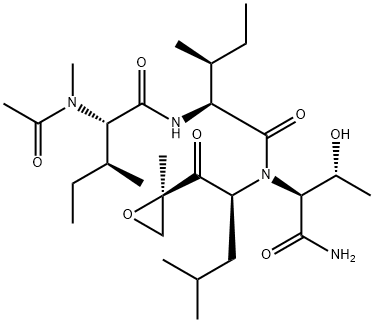Epoxomicin is a potent proteasome inhibitor, primarily inhibiting the activity of CTRL(chymotrypsin-like proteasome). The novel α-epoxy ketone moiety of Epoxomicin forms covalent bonds with residues in particular catalytic subunits of the enzyme, disabling activity. The trypsin-like and peptidyl-glutamyl peptide hydrolyzing behavior of the proteasome were both inhibited by Epoxomicin as well (at 100 and 1,000-fold slower rates, respectively). Bone formation is heavily regulated by the ubiquitin-proteasome pathway, and Epoxomicin was shown to increase both bone volume and bone formation rates in rodents. Another study demonstrates that exposure to Epoxomicin and other proteasome inhibitors leads to dopaminergic cell death, producing a model of Parkinson's disease in vivo. Epoxomicin is an inhibitor of 20S Proteasome.

